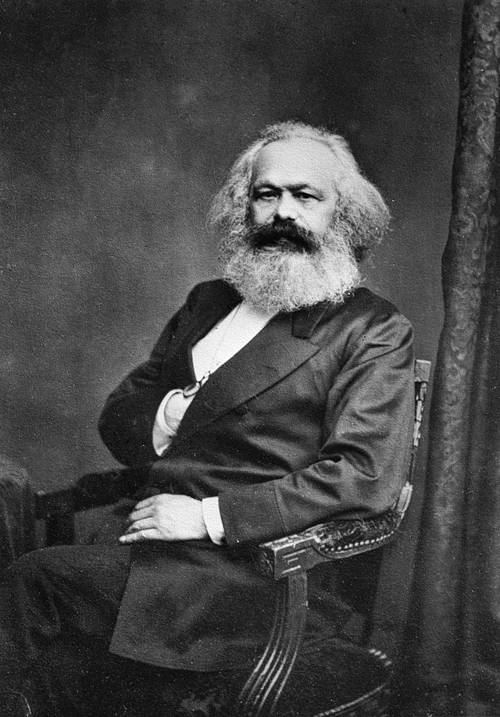
FAQ About Karl Marx

Who was Karl Marx?
Karl Marx was a 19th-century philosopher, economist, historian, sociologist, political theorist, journalist, and socialist revolutionary. Born on May 5, 1818, in Trier, Prussia (now Germany), he is best known for his theories about capitalism and communism. Marx's ideas had a profound impact on political thought worldwide, particularly through his books 'The Communist Manifesto' and 'Das Kapital'.

What is 'The Communist Manifesto'?
The Communist Manifesto, written by Karl Marx and Friedrich Engels, is a political pamphlet published in 1848 that outlines the principles of communism. It presents an analytical approach to the class struggle and the problems arising from capitalism. It calls for the working class to rise against capitalist societies and highlights the potential for the proletariat to overthrow the bourgeoisie in favor of socialism and eventually, communism.

What was Karl Marx's role in developing economic theories?
Karl Marx is well-known for his critique of political economy. His analysis of capitalism is detailed in his seminal work, Das Kapital (Capital), where he examines how capitalist societies function and theorizes about labor, value, and capital. Marx's work introduced concepts like class struggle, surplus value, and alienation, influencing various fields such as economics, sociology, and political science.

What is Marxism?
Marxism is a social, political, and economic theory originated by Karl Marx, which focuses on the struggles between capitalists and the working class. Marxism posits that the capitalist system perpetuates inequality and exploitation, arguing that societies progress through class struggle leading eventually to a classless society. It serves as the foundation for the 20th-century political movement toward socialism and communism.

What is the concept of class struggle in Marxist theory?
Class struggle is a central concept in Marxist theory. It refers to the conflict of interests between the classes, primarily the bourgeoisie (capitalists) and the proletariat (working class). According to Marx, the exploitation inherent in capitalism leads the proletariat to unite and overthrow the bourgeoisie, ultimately aiming to establish a classless society.

What is the significance of 'Das Kapital'?
Das Kapital is Karl Marx's most important contribution to economic literature, analyzing the capitalist system in detail. Published in several volumes, it delves into concepts such as commodity, labor value, capital accumulation, and crises of capitalism. Marx's critique in Das Kapital laid the groundwork for future socialist movements and continues to be studied in economics, politics, and sociology.

Did Karl Marx have political influence during his life?
While Karl Marx was not a politician, his writings had a significant influence on revolutionary movements and political thought during and after his lifetime. He was involved in various revolutionary groups and co-founded the International Workingmen's Association, also known as the First International. His ideas gained traction, especially after his death, inspiring socialist and communist movements around the world.

How did Marx's philosophy differ from other philosophers of his time?
Marx's philosophy, often described as historical materialism, focused on the material conditions of life and the economic activities that shape society, which contrasted with the idealist philosophies prevalent during his time. While many philosophers discussed metaphysical concepts, Marx grounded his theories in real-world economic practices, emphasizing the importance of class relations and economic systems in understanding historical development.

What is historical materialism?
Historical materialism is a methodology developed by Karl Marx for analyzing the historical development of societies. It posits that the structure of society and the way it develops is primarily determined by economic relationships and the means of production. According to historical materialism, changes in material conditions precede and drive historical transformations, including changes in politics, culture, and ideology.

What are some common misconceptions about Karl Marx and his theories?
One common misconception is that Marx advocated for violent revolution. While Marx predicted that a proletarian revolution might occur, he didn't necessarily endorse violence. Additionally, Marx never provided a detailed blueprint for a communist society, leading some to incorrectly assume communism, as practiced in the 20th century under authoritarian regimes, was fully aligned with his ideas. Marx emphasized a stateless, classless society, different from the state-controlled systems seen later.

How did Karl Marx influence modern political thought?
Karl Marx significantly influenced modern political thought by introducing ideas about capitalism, class structures, and revolutionary change. His theories underpin many socialist and communist movements, impacting policies and ideologies worldwide. Marxist analyses of capitalism continue to inform debates on economic inequality, labor rights, and social justice in contemporary politics.

Where did Karl Marx live during his lifetime?
Karl Marx was born in Trier, Prussia (modern-day Germany), and studied at the universities of Bonn and Berlin. Due to his radical political views, he was exiled and moved to Paris, Brussels, and eventually London, where he spent a significant portion of his life and conducted much of his most influential work, including writing Das Kapital and collaborating with Friedrich Engels.

What was the relationship between Karl Marx and Friedrich Engels?
Friendship and intellectual collaboration defined the relationship between Karl Marx and Friedrich Engels. Engels supported Marx financially and contributed to his works, notably co-authoring The Communist Manifesto. Their correspondence and collaborative writings fueled the development of Marxist theory, with Engels editing and publishing some of Marx's works posthumously.

What impact did Karl Marx have on sociology?
Karl Marx had a profound impact on the field of sociology by introducing a new way of understanding society through class relations and economic systems. His work laid the foundation for conflict theory, which views social structures as a result of ongoing conflicts between disparate groups, particularly concerning resources and power dynamics.

What was Karl Marx's view on religion?
Karl Marx famously viewed religion as "the opium of the people," suggesting it was a tool used by powerful classes to keep the proletariat subdued and distracted from their material suffering. He believed religion served to justify existing inequalities and divert attention from the pursuit of social change, advocating instead for focusing on tangible socio-economic transformations.

How is Karl Marx's work relevant today?
Karl Marx's work remains relevant today, particularly in discussions of economic inequality, globalization, labor rights, and social justice. His critique of capitalism provides a framework for analyzing the strengths and weaknesses of current economic systems and inspires advocates for policies that promote fairness, equality, and sustainable development.

Did Karl Marx write any other notable works besides 'The Communist Manifesto' and 'Das Kapital'?
Yes, besides The Communist Manifesto and Das Kapital, Karl Marx wrote several other influential works, including The German Ideology, The Economic and Philosophic Manuscripts of 1844, and The Critique of the Gotha Program. These works explore themes of alienation, political economy, and socialist theory, contributing to the broader body of Marxist thought.

What influenced Karl Marx's ideas on capitalism and class struggle?
Karl Marx's ideas were influenced by various sources, including German philosophy, especially the works of Hegel, British political economy, particularly the ideas of Adam Smith and David Ricardo, and French socialism. These intellectual traditions helped Marx develop his critique of capitalist society, focusing on economic dynamics and historical change.

How did Marx define proletariat and bourgeoisie?
In Marxist theory, the proletariat refers to the working class, those who do not own the means of production and must sell their labor to survive. The bourgeoisie, on the other hand, are the capitalists, the class that owns the means of production and profits from the labor of the proletariat. The conflict between these two classes is central to Marx's analysis of capitalist societies.

What is the concept of alienation in Marx's work?
Alienation, in Marx's work, refers to the estrangement of people from aspects of their human nature due to living in a society stratified by class, particularly under capitalism. Marx believed that workers become alienated because they are not in control of the products they create or the labor process, leading to a loss of self-worth and exploitation.
